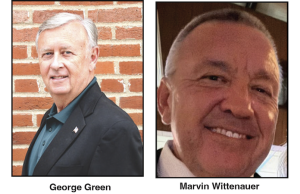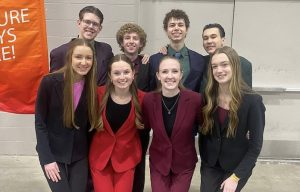Topics du jour for Columbia
While record rains in April have long evaporated from the area, Columbia officials are still dealing with the aftermath in two different parts of the city.
Columbia City Engineer Chris Smith was kept busy during Monday night’s city council meeting, providing an update on the statuses of Valmeyer Road and Creekside Park in addition to other business.
As previously reported, the city is looking into the possibility of installing culverts underneath a section of Valmeyer Road near Carr Creek as a remedy for recurring issues on that stretch of the road.
Valmeyer Road has been closed from its intersection at D Road to Bluff Road since early April following a collapse of the roadway.
During Monday’s meeting, Smith reiterated the road’s proximity to the creek brings about five more agencies into play.
Information regarding a potential installation of culverts has been sent to the appropriate parties, and the city is now awaiting a response.
Smith added the collapse of the roadway has expanded since April and now extends to the creek in some parts, which effectively eliminates a previously proposed option of installing support piers underneath the roadway.
With the size and nature of the repeated collapses on Valmeyer Road, Smith seemed to favor the culvert plan, as it would provide better ease of access to investigate subsurface road conditions in the future.
He also noted a “soil pinning” solution would require several additional – and potentially costly – challenges, such as added safety measures.
While it would be convenient to install the culverts while a bridge project on Bluff Road has already required complete closure of Valmeyer Road from D Road to Bluff Road, Smith pointed out there are many unknown factors to consider before beginning the project in earnest.
In addition to heavy regulations imposed by entities such as the Illinois Department of Natural Resources, Smith expressed a commitment to a more permanent solution rather than a quick fix which would need to be readdressed in the future.
“Do we want to live with the situation a long time?” Smith asked, noting some of the options are trending toward a $1 million price tag.
He also said he would not feel comfortable ordering a “half million dollars worth of culverts until we actually know we can use them… We’re trying to figure out what is fiscally responsible, what is least impactful – what might have the best return on investment for future projects,” Smith concluded. “It takes a little bit of time to go through those things, especially when we’re not necessarily in charge.”
Smith also shed more light on the work stoppage on what is to be Creekside Park in the northeast part of the city.
Excavation began this spring but was halted as April rains turned the site into what Smith described as a “water bed” even after the rains had stopped.
Due to the park’s proximity to a creek and several lakes and its relation to the area’s water table, the soil at the Creekside Park location became difficult to manipulate.
Smith added much of the soil removed from the site is to be transferred to the city’s wastewater lagoon to facilitate future improvements; however, soil saturation severely hampered any movement, leading to the work stoppage.
“It just wasn’t a workable site,” Smith continued. “We came to the conclusion that we just need to take a pause here. Let’s have Mother Nature dry things up.”
Smith acknowledged the construction equipment had been moved from the site, but has returned this week, with plans to resume work as early as next week.
“We can’t expect them to wait around. They have other things to do. We realize that,” Smith said, reminding the audience the spring and summer months are the busiest time for contractors and construction crews.
If work proceeds as planned, Smith said the current phase of park development could be finished by the end of August, weather permitting.
Smith also dispelled rumors that work was stopped due to soil on the site being contaminated.
In responding to questions of nearby residents about soil issues, Smith responded, “There are soil issues. It’s wet. It’s not like this is an ‘Erin Brockovich’ site,” referring to a movie about a California lawyer who initiated a groundwater contamination lawsuit in the 1990s.
On a positive note, Smith reported the lake planned for Creekside Park was holding water without the need to be “charged,” which he said was “ a good sign.”
Smith also announced the Federal Emergency Management Agency would be releasing its updated flood plain maps for the Columbia area on Aug. 19.
The preliminary maps were made available for public review at an event at 11 South last year.
Smith said the maps are exactly the same as the preliminary maps, but added he was still unsure about what impacts the updated flood areas will have on residential and commercial properties in those areas.
Smith plans on having the new maps available at Columbiail.gov as soon as possible.
He also noted the council would need to pass a new floodplain ordinance.
Smith also cautioned property owners to be aware of any mail or communication from insurance companies in the near future.
“For the most part, people are not going to be affected. It’s just going to be a nuisance to go through the process,” Smith said, qualifying the statement as his “gut feeling” since FEMA has not provided a list or any guidance as to who will be affected.
Smith will be meeting with FEMA representatives in order to gather as much information as possible and make it available to Columbia residents.
In other business, aldermen approved a professional services agreement with SWT Design to draft a design plan for a splash pad at Bolm-Schuhkraft Park and a dog park at Admiral Trost Park.
While the move is preliminary, Smith advised the council to remember the $50,000 price tag for both designs would be used to leverage grants potentially worth hundreds of thousands of dollars.
Aldermen also approved the purchase of lagoon aeration equipment at just under $100,000 for continued improvements to the city’s current sewage treatment plant.
The move is made “while planning for the impending capital investment required to meet Illinois Environmental Protection Agency mandates” concerning wastewater treatment facilities, according to the agenda report.
The topic was one of the driving forces of the city’s failed “home rule” voter referendum in 2023.
The IEPA requires Columbia to have its current lagoon-style facility replaced by a functional “Class 1” facility by 2035.
Estimated costs for a new facility in 2023 were upwards of $25 million, although Columbia City Administrator Doug Brimm spoke of a “new lagoon cell” which may be able to satisfy IEPA requirements at a lower cost.
In other action, the council approved waterline easements on three properties which Smith said are necessary to move forward with promised infrastructure extensions to the east of Columbia Quarry Road.
Aldermen also approved proposals to furnish road improvement and construction materials through the city’s Motor Fuel Tax Program.
Toward the beginning of the meeting, an ordinance was passed which gives the city more leverage in dealing with repeat violators of the city’s regulations concerning weeds and tall grass. As passed, the city will be able to impose progressive fines and instant abatement of overgrown vegetation following a third violation notice issued in one year.
The city also passed a resolution amending an easement granted to the city by the Gedern Village Homeowners’ Association which allows for additional signage to be installed at the point the GM&O Heritage Trail enters subdivision boundaries.
In a surprise announcement, the city amended its employee compensation ordinance by adding the “Land Use and Planning Coordinator” position.
Under the direction of the city engineer, the coordinator will be “responsible for the city’s land use planning, zoning and associated plan review activities,” according to the job description.
The coordinator will also serve as Columbia’s zoning administrator and a liaison between developers and the city regarding city-specific requirements.
John Brancaglione was on hand as he was announced as the new Columbia Land Use and Planning Coordinator.
Brancaglione had been a consultant with PGAV Planners of St. Louis, the firm which has been used extensively by Columbia in recent years.
Brangcaglione was the person tasked with finalizing the oft-delayed comprehensive plan as well as a business district established in the city last year.
The position carries a “grade 9” salary, which ranges from a minimum salary of $71,962 to maximum of $109,750.
The council on Monday also approved a collective bargaining agreement pertaining to the city’s emergency telecommunications staff.
The next meeting of the Columbia City Council will begin at 6:30 p.m. July 21 at City Hall. Livestream and recordings of the meetings are available through the City of Columbia, IL – Government Facebook page.






